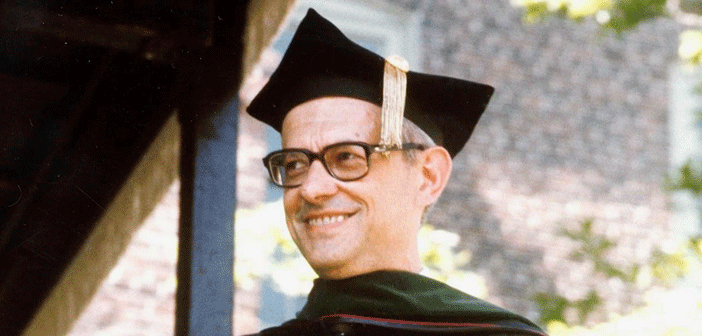Aronson was a devoted teacher. “He remained deeply committed to education and mentoring into the last week of his life, hosting groups of students to discuss medicine, politics, history and how to be an ethical and effective provider of care,” said Terrie Fox Wetle, PhD, dean of the School of Public Health.
Humility in Medicine
Aronson saw medicine change drastically in a career of practice, research, and education that spanned more than seven decades. Although he celebrated advances in medical technology and knowledge, among the changes he sought to effect through education was to supplant the detachment emphasized in his own midcentury medical education with one of modesty and compassion.
“The medical schools of that era trained students for a life of solo practice and therefore an immersion in a profession of unilateral decision-making, impassivity in the face of calamity, aloofness, and fatherly rather than brotherly demeanor,” he wrote in a blog post for Rhode Island Public Radio last year.
In a recent interview he recalled telling state legislators in the early 1970s that Brown’s medical school would be different.
“I tried to explain that we’re going to train men and women to be individual physicians, to learn both responsibility and humility, and a long-term commitment in a profession that is intensely imperfect,” he said.
Jonathan Gell ’72 MMS’75 MD’75, a member of the first graduating class, described Aronson’s approach to Rhode Island Medical Journal managing editor Mary Korr, who quoted him in Medical Odysseys, a book of essays she co-wrote with Friedman and Aronson, “Dr. Aronson taught us that medicine is the most scientific of the humanities, the most human of the sciences.”
Community Pillar
At the time of his death, Aronson was receiving palliative care from Home and Hospice Care of Rhode Island. An important sign of his desire to bring greater compassion to medicine, he helped to found that organization in the early 1970s.
“His dominant professional passion for the last three decades has been hospice care and palliative medicine,” Besdine said.
Aronson contributed to the local and medical communities in many other ways as well. He served as editor of the Rhode Island Medical Journal from 1989 to 1998. In the 1980s he also served on the Liaison Committee for Medical Education, the official body that accredits medical schools.
His career has inspired local organizations and donors to establish a scholarship, the endowed chair held by Friedman, and a prize for the best graduating medical student in the neurosciences. These honors help to continue academic and medical progress in his name.
Beyond medical circles in Rhode Island, however, Aronson may be best known for his weekly columns in the Providence Journal, which he has written for more than 20 years. In a column January 19, 2015, he delved into the topic of death, musing that in the distant past, the end of a life likely seemed unremarkable.
“Except for exalted leaders, death was a happening rather than an event, a part of the tapestry of surviving in an unforgiving world; and death was the end of an uncelebrated, brutal existence,” he wrote.
Aronson’s work to preserve the lives and health of patients, and to provide dignified care and comfort those finally, inevitably dying, made him an exalted leader. His existence is celebrated by patients, students, colleagues, and readers alike.
“It is precisely because he was so accomplished, and humble about all that he had done, that he was such an icon to those who knew him,” said Fred J. Schiffman, MD, the Sigal Family Professor of Humanistic Medicine.
A memorial service will he held at Brown University in the spring.




